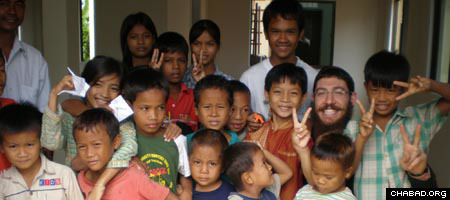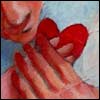"Are these going to be high enough, Mayer?" Saadya Notik asked of the potted palms that had just been wheeled in on a trolley to the Phnom Penh room at the Hotel InterContinental in Cambodia.
Rabbi Mayer Zarchi, 25, from Brooklyn, N.Y., leaned back to assess the situation. He squinted and finally nodded his approval.
The potted palms would suffice to divide female worshippers from their male counterparts on Friday evening and Saturday during Cambodia's first-ever organized service for Yom Kippur, the holiest of all Jewish holidays.
"It's for concentration," Notik, a 24-year-old Brooklyn rabbi wearing the black felt fedora common to adherent of Chabad-Lubavitch Chassidism, offered as an explanation for separating the genders during prayer services.
But besides the plants, some additional alterations needed to be made to the luxuriant, carpeted hall before services could begin. The sandstone statue of a traditional Cambodian apsara dancer near the doorway, for instance, had to be covered, as did the wall of mirrors on the eastern side of the room.
"We don't pray to shapes and forms," said Notik, adding that Judaism holds that the focus should be on the soul and not on the body.
The hundreds of thousands of Lubavitchers around the world are mainly concentrated in the United States and Israel, but on Sept. 20, at the behest of Bernard Krisher, publisher of The Cambodia Daily, three Lubavitch rabbinical students came to the country at their own expense.
"We believe the quintessence of G‑d finds deep expression in Cambodia as well," said Zarchi.
Beginning at sundown that Friday, Notik, Zarchi, and Moshe Goldstein, a 22-year-old Israeli rabbi-in-training, led more than 25 people, the majority of them expatriates, in the Yom Kippur service.
The service was conducted in Hebrew, with occasional English explanations.
Services continued all day Saturday, a traditional day of fasting for Jews, starting at about 10 a.m. and ending at sundown.
Isolated but Connected
There aren't too many Jews in Buddhist-dominated Phnom Penh, let alone those who are Orthodox. So it came as no surprise that a crowd of curious Cambodians surrounded Notik when he took a quick Friday afternoon visit to the riverside.
He said later that he'd heard stories of a Cambodian man living on the city's outskirts who considered himself Jewish and kept mostly to himself. Turning to Phnom Penh's Jewish expatriate community, Notik praised the dedication of those so far from the world's Jewish center to hold on to their heritage and identity.
"Jews here are doing the real tikkun olam," he said, using a Hebrew phrase for repairing the world. "Just because you are geographically isolated, doesn't mean you are isolated from the larger community."
In the same vein, Notik explained, Chabad-Lubavitch emissaries dedicate their lives to reaching out to Jews in the farthest corners of the world.
"We have a responsibility to educate our brothers," he said. "How are we supposed to rectify the world if we stay within the confines of a synagogue?"
Ariella Cwikel, 23, a former Phnom Penh resident, who was passing through town on her way home to Israel after a stint in India, said that she was surprised and overjoyed to hear about the Yom Kippur service.
"I thought I'd be the only Jew in town," she said.







Start a Discussion